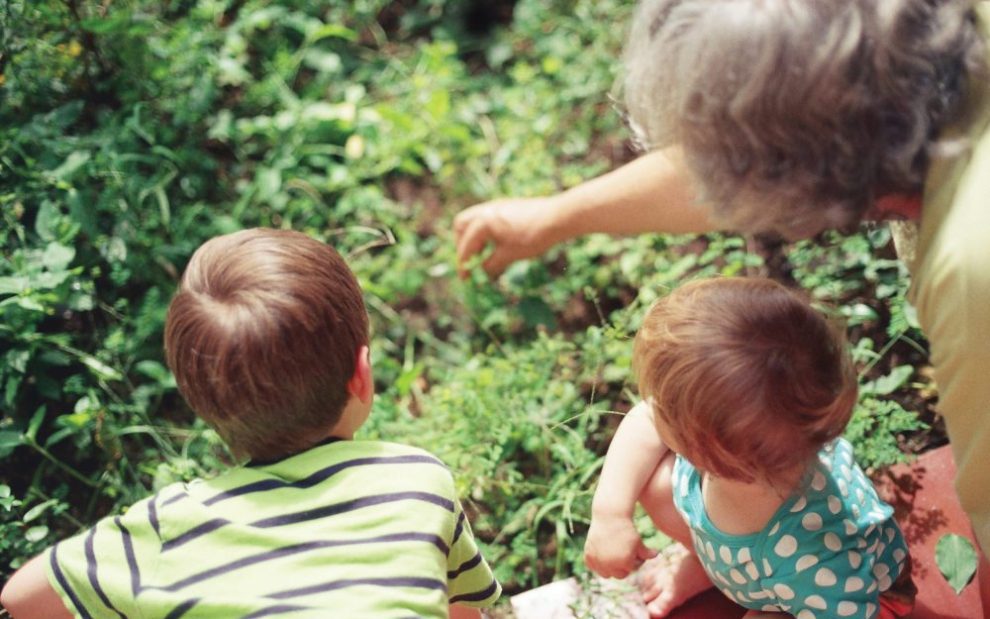Why are some given the chance to grandparent? Maybe to grow closer to God later in life, or so God can use this time to transform us. The most cantankerous, self-absorbed jerks suddenly discover a sweeter side. The stern start spoiling with glee. The introverts display the photos, cute sayings, and stories. Those who thought their physical ailments were paralyzing sprint after the toddler heading for the street or hoist aging bodies up the jungle gym when a grandchild quails at the terrifying steepness of the slide. As “the child grows in wisdom, age and grace” (Luke 2:52), we get to marvel.
What else happens on re-entry to the world of red boots, strollers, plastic wading pools, pull-ups and potty talk, strange congealed substances at the bottom of sippy cups, Band-Aids with cartoon faces—or fergit it!—bedtime stories from which the reader cannot deviate one syllable from the text, big-girl beds, roaring tussles over small toy figures who will be utterly forgotten in four minutes, the “day care cough,” tiny mis-matched socks, diaper wipes (that splendid, disposable invention)? Wading into this strewn world again is partly new, partly familiar, like a second chance. At what other time would I have the opportunity to make words from the letters in alphabet soup or scramble into a cozy fort made with blankets, built beneath a five-year-old’s bunk bed?
One risk to long-time believers is overfamiliarity with the faith. But now I can hear the explanation of Holy Week à la four-year-old, with eyes big as plates. “The bad guys killed Jesus. But we don’t need to worry. He Wose. Then Jesus talked to God and God asked Santa, and now we get Pwesents for Easter!” I can burst with pride when a small boy saves me a special, gooey treat with neon-colored frosting from a birthday party. Grammy is the first one told the breathless news, “There’s a Lego in the toilet!” (She also gets to fish it—tiny and white—out.)
Just as the child Jesus matured, so do grands. A small, furious, un-potty-trained despot who loathes pre-school transforms into a confident, secure kindergartener, poised to learn all manner of miraculous skills like reading, math, and bicycling. Most grandparents know their own children acquired the same tools somewhere along the way, but it happened in a blur. Then, the focus was on keeping everyone fed, clean, and relatively prompt. Now we have more time to better appreciate the milestones.
Standing smack in a stream of grace, many are blessed to watch our own children parent with far more patience and skill than we ever had. The God of second chances—and fiftieth and five hundredth—shows off through grandparenting. “You missed the mystery first time around?” this God says. “Here’s another crack at it!” The professional wardrobe and the identity that went with it no longer seem important when the lucky grandparent is chosen as “base” for tag. For the fortunate, the sound and fury of a career, the daily demands of a job, the urgency of earning money can sputter into a contented quiet.
The timing is perfect—just as some start growing jaded and crochety, grandchildren bring an infusion of energy. Despite a cynicism that grows like barnacles over the years, few can ignore the contagious enthusiasm of youth. A child whose room is lined with toys three feet deep bursts with joy on her first day of school: “I Got A New Pencil. All. My. Own.” A Muslim great-grandmother describes a great-grandson who doesn’t walk when he can run, breathe when he can gasp, or speak when he can shout. He exudes excitement about a birthday party: “Now we get kale chips and mint tea!”
What we know intuitively about the timing is confirmed by social scientists like Arthur Brooks in his book, From Strength to Strength. He explains that one kind of intelligence, termed “fluid” involves innovation, then peaks and declines fairly early in life. But some people develop a second kind, “crystallized intelligence,” more of a storehouse that leads to mentoring and generativity.
My granddaughter sums up this theory with remarkable simplicity when on our walk to elementary school, I tease about accompanying her to high school. Maybe I could finally understand math? She disagrees: “You’re off the learning street now, Grammy. You’re on the giving street.”
“Pure” and “innocent” are overused words which don’t begin to touch how unguarded grandkids are, how completely unaware of adult games and camouflages. Their unlined, upturned faces lift like bowls to us: what will we pour in? Since they are utterly straightforward in their relationships, we know exactly where we stand—by the howl or the hug, not much wimpy middle ground. Nor are children impressed by awards or affluence, prestige or power, the ego rewards some adults spend a lifetime pursuing.
Centered in their bodies, they call elders who spend time in their heads to the pleasures of the senses. They know what’s important: cuddles, naps, milk, soft bears—and no social constraint prevents demanding attention when they need it. Their inventive language and unpredictable behavior bring a joy and surprise we may not have felt since our own children were small and vulnerable. Even before they speak, they communicate clearly, and few can resist the first outstretched arms and unequivocal command, “Up!”
In grandchildren, hope is made visible, tangible, a promise that what I’ve worked a lifetime to become will live on. Whether it’s love of reading or music, work for social justice, appreciation of beauty, dedication to health—all that is finest in us is mysteriously passed on. What a blessed glimpse of our own immortality!
Originally published in A Generous Lap: A Spirituality of Grandparenting, Orbis, 2023. Reprinted with permission.
This article also appears in the September 2024 issue of U.S. Catholic (Vol. 89, No. 9, pages 21-22). Click here to subscribe to the magazine.
Image: Unsplash/Nikoline Arns















Add comment